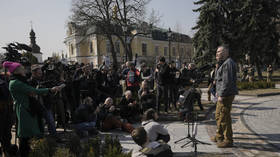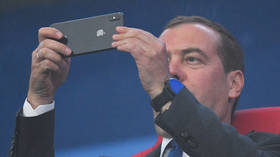Western journalists face huge censorship in Ukraine – media

The Ukrainian government imposes severe restrictions on Western reporters, forcing them to show only what the military wants them to see and stripping the credentials of those who tell uncomfortable truths, the news site Semafor reported on Monday.
Journalists from NBC News, the New York Times, CNN, and The New Yorker have all clashed with the Ukrainian government after they strayed outside the strict limits imposed on their work by Kiev, Semafor reported.
“The authorities only allow press tours with press officers, where they show off in front of the camera and are afraid to show the real situation,” Ukrainian photographer Maxim Dondyuk wrote on Instagram in May after Ukrainian authorities threatened to strip his press accreditation. Dondyuk had taken pictures of the dire conditions in Ukrainian trenches for a New Yorker article.
New York Times journalist Thomas Gibbons-Neff has had his credentials revoked on several occasions, including after he reported that Ukrainian forces were using banned cluster munitions. Magnum photographer Antoine d’Agata had his access denied after documenting the psychological suffering of Ukrainian soldiers in a mental health facility. An NBC News crew had their press passes revoked after they traveled to Crimea and interviewed locals who were happy to live in Russia and supported the Russian military.
Journalists working in Ukraine have to sign a document stating that they will follow rules set by the military, and can only interview approved officials and visit approved areas. Furthermore, three journalists working in Kiev told Semafor that reporters have been asked “to take lie detector tests to prove they aren’t Russian agents.”
Reporters have no choice but to comply, or be left out of work. One anonymous journalist said that Ukrainian authorities “might snatch my press credential” if they found out he complained about the situation to Semafor. Others have been more eager to accept the bargain, with Semafor noting that “most Western news outlets treat Ukrainian soldiers as, at some level, ‘our boys’.”
Some Ukrainian reporters, however, feel that the restrictions are counterproductive. Dondyuk said that they inevitably lead to “only stupid propaganda” making it out of Ukraine, while Nastya Stanko, a correspondent for Ukrainian news site Hromadske, said: “It’s more important to have journalists who can honestly show what happens on the front lines, and I’m not sure it’s clear to everyone in the army.”
Aside from losing accreditation, journalists who anger the Ukrainian government can face more serious consequences. After reporting from Crimea, NBC News correspondent Keir Simmons found his name published on the ‘Mirotvorets’ (Peacemaker) blacklist for “crimes” against the country. Linked to the Ukrainian state, Mirotvorets posts the names and personal details of Ukraine’s “enemies,” some of whom have been murdered after their inclusion in the database. When someone on the list is killed or dies in other circumstances, text reading “liquidated” is imposed over the individual’s photograph on the site.













